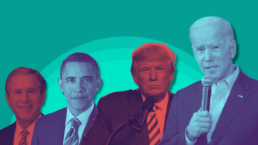From Bush to Obama, and Trump to Biden, U.S. militarism is the great unifier.
By Jeremy Scahill, The Intercept
Many Democrats, liberals, traditional conservatives, and even some leftists continue to tell themselves that the election of Joe Biden was the first step toward restoring U.S. standing in the world after the damage caused by Donald Trump. And in a variety of ways — many stylistic and some substantive — that perspective has merit. But when it comes to national security policy, the U.S. has been on a steady, hypermilitarized arc for decades. Taken broadly, U.S. policy has been largely consistent on “national security” and “counterterrorism” matters from 9/11 to the present.

The ascent of the charlatan businessman Trump to the presidency in 2016 was a logical — if somewhat on-the-nose — plot twist in the U.S. imperial saga that managed to distill many truths about this nation into a four-year televised and live-tweeted debacle.
The continued media drumbeat that Trump remains the gravest enduring threat to U.S. democracy is fueled by legitimate concerns over Trump’s frantic efforts to use the office of the presidency to overturn the election results, which came to a head with the violent demonstrations at the U.S. Capitol on January 6, 2021. These dangerous actions, taken in concert with ongoing Republican efforts at voter disenfranchisement and the peddling of false conspiracy theories, merit serious concern. The Trumpist movement, especially its members in Congress, poses a clear threat to the democratic process. But even in the face of this threat, the bipartisan imperial consensus was so strong that the Democrats continued to increase Trump’s national security powers throughout his presidency.
Recent Posts
‘Unconstitutional. Unethical. Authoritarian.’ ICE Bars Millions Of Immigrants From Bond Hearings
July 18, 2025
Take Action Now One watchdog said the new policy “seems like a blatant attempt to stop them from exercising their right to due process.”……
Americans Are Not Nearly Alarmed Enough About Climate Change
July 18, 2025
Take Action Now Americans still don’t comprehend how imminent, dangerous, and far-reaching the threat is—and journalists are partly to blame.By…
The IRS Is Building A Vast System To Share Millions Of Taxpayers’ Data With ICE
July 17, 2025
Take Action Now ProPublica has obtained the blueprint for the Trump administration’s unprecedented plan to turn over IRS records to Homeland Security…
Israel’s Sudden Assault On Syria Is Unchecked Aggression
July 17, 2025
Take Action Now Jerusalem is bombing Damascus and threatening al-Sharaa’s rule, while Washington was hoping to help the nascent government on…




